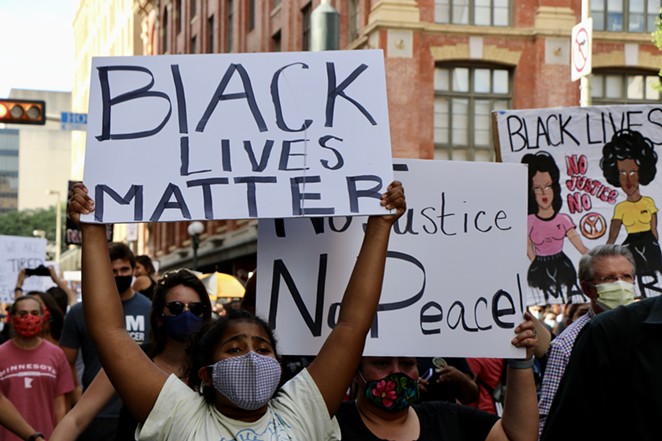Petitioning for Police Reform: Efforts To Rein In SAPD’s Union Could Be Headed To a Ballot Referendum

A new organization is vying to let San Antonio voters decide next May whether to roll back collective bargaining for the local police union and end an arbitration process that makes it difficult to fire bad officers.
Ojiyoma Martin, founder of newly minted Fix SAPD, said she’s in talks with other organizing groups to secure local ballot measures that would overturn chapters 143 and 174 of the state government code. The former sets up rules governing how officers can be fired — a lopsided process, police accountability activists argue — while the latter requires collective bargaining with the city’s powerful police union.
Under state election law, both can be put to a referendum, assuming Fix SAPD can collect enough signatures from Alamo City voters.
“This is going to take every hand in San Antonio signing, organizing, fundraising and working together,” Martin said. “It will take all of us. Police reform is a bipartisan issue.”
Martin, a mother of two who works at a pediatric speech clinic, started Fix SAPD in the wake of protests against the police killing of George Floyd.
Although she has no background in activism, she said she could no longer stay silent after learning that more than two-thirds of San Antonio cops fired over the past 10 years ended up back on the job thanks to the arbitration process guaranteed under the police contract.
Ticking Clock
While Fix SAPD has a website explaining its goals and concerns, it hasn’t formally launched a petition drive. That’s because under state election rules, the group has just 180 days to collect the signatures needed to put measures onto the May municipal ballot.
It will take 10% of the city’s eligible voters, or around 78,000 San Antonians’ signatures, to get a reversal of Chapter 143 on the ballot. Landing a proposal to overturn Chapter 174 would require fewer signatures — 20,000 or 5% of municipal voters, whichever is lower.
Those requirements set a high bar for a startup group that only counts 20 people in its ranks. What’s more, state election rules require the group to collect signatures in person rather than online — no mean feat in the middle of a pandemic.
That’s why Martin said she’s in talks with other organizing groups to help. While she declined to identify its potential allies, she said Fix SAPD had “recent breakthroughs” in forging those connections. An announcement is coming soon, she added.
Two potential allies in the fight are MOVE Texas and the Texas Organizing Project, a pair of San Antonio-based activist groups pivotal in collecting 145,000 signatures two years ago in favor of letting voters decide on a paid sick time rule. Instead, council ultimately adopted its own sick-time resolution, since mired in a lengthy legal fight.
At press time Monday, TOP Executive Director Michelle Tremillo said her group will partner with Fix SAPD. MOVE Executive Director H. Drew Galloway confirmed he’s held talks with the organization on its petition effort.
“It’s definitely a consideration,” he said. “We see [a ballot measure on chapters 143 and 174] as a one of the first steps in terms of expanding meaningful criminal justice reforms in our city.”
‘Everything They Can’
Even with help, Martin acknowledges the fight won’t be easy.
The police union is likely to spend freely on a public relations blitz once it comes time for a vote. She also predicts it will call on longtime political ally Greg Brockhouse, the former District 6 city council representative who wielded enough influence with Northside voters to force a runoff with Mayor Ron Nirenberg last election cycle.
“The union is going to throw everything they can at this,” Martin said. “That means hundreds of thousands, if not millions, of dollars.”
Even so, nationwide Black Lives Matter protests and next year’s pending negotiation for a new SAPD union contract offer an unprecedented chance for activists, said Gerald Reamey, a St. Mary’s University Law School professor who tracks policing issues. Local organizers are wise to target collective bargaining and the rules that govern the union’s ironclad arbitration process, he added.
“If people who are concerned about this issue don’t seize the moment, then I don’t know when it could even happen,” Reamey said. “This really is the opportunity.”
Martin said she hopes overturning chapters 143 and 174 will open the door for additional curbs on overreach by local police. At present, the rules make council afraid to stand up to the union and curb excesses by its rank and file, she added.
“We’re trying to make it easier for every other police-reform initiative moving forward,” Martin said.
Stay on top of San Antonio news and views. Sign up for our Weekly Headlines Newsletter.

















